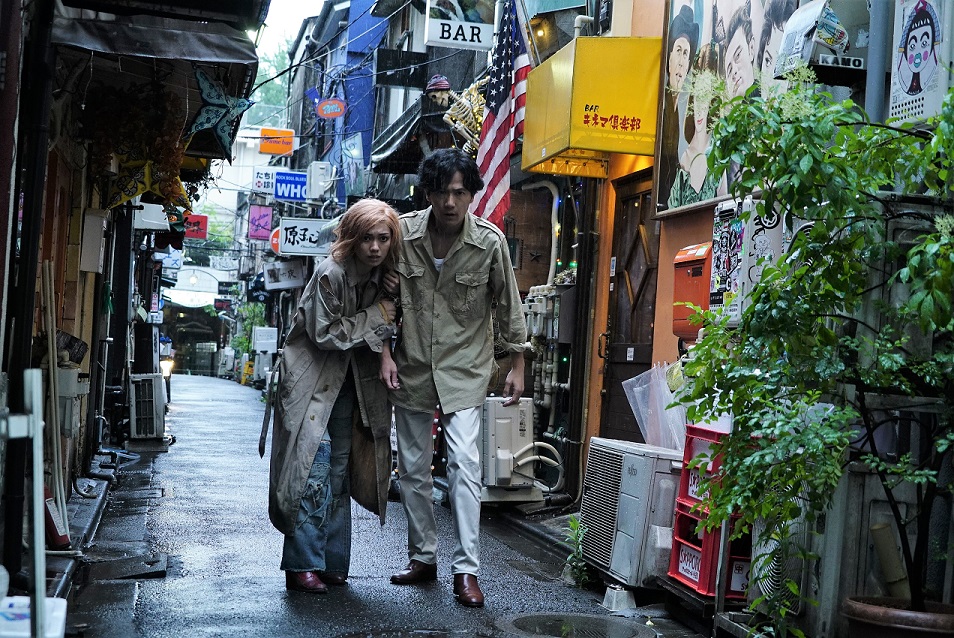If you are aware of Macoto Tezuka, it is probably through his cult classic feature debut, 1985’s The Legend of Stardust Brothers (which was recently reissued on BluRay). He is also the son of legendary manga artist Osamu Tezuka, which bears mentioning as this surreal love story is an adaptation of one of his late father’s lesser-known, more adult-oriented work. Given its offbeat tone and splashy style, it is easy to see why it would appeal to a visual stylist like the younger Tezuka. A shame, then, that it also exposes some of his weaknesses as a storyteller.
Yosuke (Goro Inagaki) is a successful trendy author short on inspiration. That is, until he stumbles (almost literally) upon Barbara (Fumi Nikaido), whom we first meet as an impossibly glamorous down-and-out drunk. Inevitably, Barbara turns Yosuke’s neatly ordered life upside down as he becomes more and more obsessed with his newfound “muse.”
There have been several movies made about the artist-muse relationship, and, initially, this feels no different. There are also several borrowed genre elements here, most notably from noir and French New Wave. It’s particularly noticeable in the character of Yosuke, who is impeccably cool, rarely without sunglasses and, of course, writes while listening to free jazz and drinking single malt. Similarly, the straight-talking, free-spirited Barbara has more than a touch of the Anna Karina about her.
The vibe might be familiar, but this is also the strongest section of the film as we see the bond between Yosuke and Barabara grow. Or do we? As there is a constant question over whether Barbara is real or merely a figment of Yosuke’s fevered imagination, it’s unclear. Regardless of this, the chemistry between Inagaki and Nakaido emanates off the screen, and Tezuka’s demonstrates his captivating eye for visuals, especially in the humorous scenes where we dive into Yosuke’s erotic imagination, bringing to mind Fellini’s 8 ½.
Even in this half of the film, there are some issues. For all its style and entertainingly absurd moments, it is hard to know how seriously to take any of this. On the one hand, the film seems to be mocking heteronormative male sexual fantasies and the male gaze – but on the other, fully indulging them. Equally, there seems to be an intent to challenge and comment on the nature of the artist-muse relationship, while also playing into that stale narrative.
Yosuke himself is problematic. Inagaki is an undoubtedly charismatic presence, but the character is hard to root for. He is frequently shown to be petulant, selfish, egotistical, and more than a little pretentious. Maybe that is the point. Perhaps we are not supposed to like him. But then again, it is hard to tell as the film seems unable to make up its mind.
Things falter further as elements of horror and the occult suddenly and unexpectedly enter the mix. There are still some highlights here too, though particularly any scene involving Barbara’s mother, an eminently weird character with yellowish skin who also appears to be wearing a wig made out of Maltesers. Another wonderfully oddball highlight involves an occult ceremony which Yosuke attends.
Much like with the tone, there is much confusion with the plot, which feels simultaneously overstuffed and undercooked. The story dangles numerous unanswered threads while also finding time to be ponderous as we aimlessly navigate Tokyo’s streets. For all that, it still makes for a mainly enjoyable, if frustrating, ride. That is up until the last 20 minutes, where the story dives into the realm of psychological horror. In this final section, shorn of its slick visuals, the movie grinds to a shuddering halt and simply becomes a trudge.
Tezuka’s Barbara is something of glorious failure. It is equipped with a couple of great central performances, a cool soundtrack, captivating visuals, and some memorably bizarre set-pieces. But ultimately, it feels hollow, directionless, and, much worse than that, towards the end, just plain dull.
Screened as part of Fantasia Festival 2020
